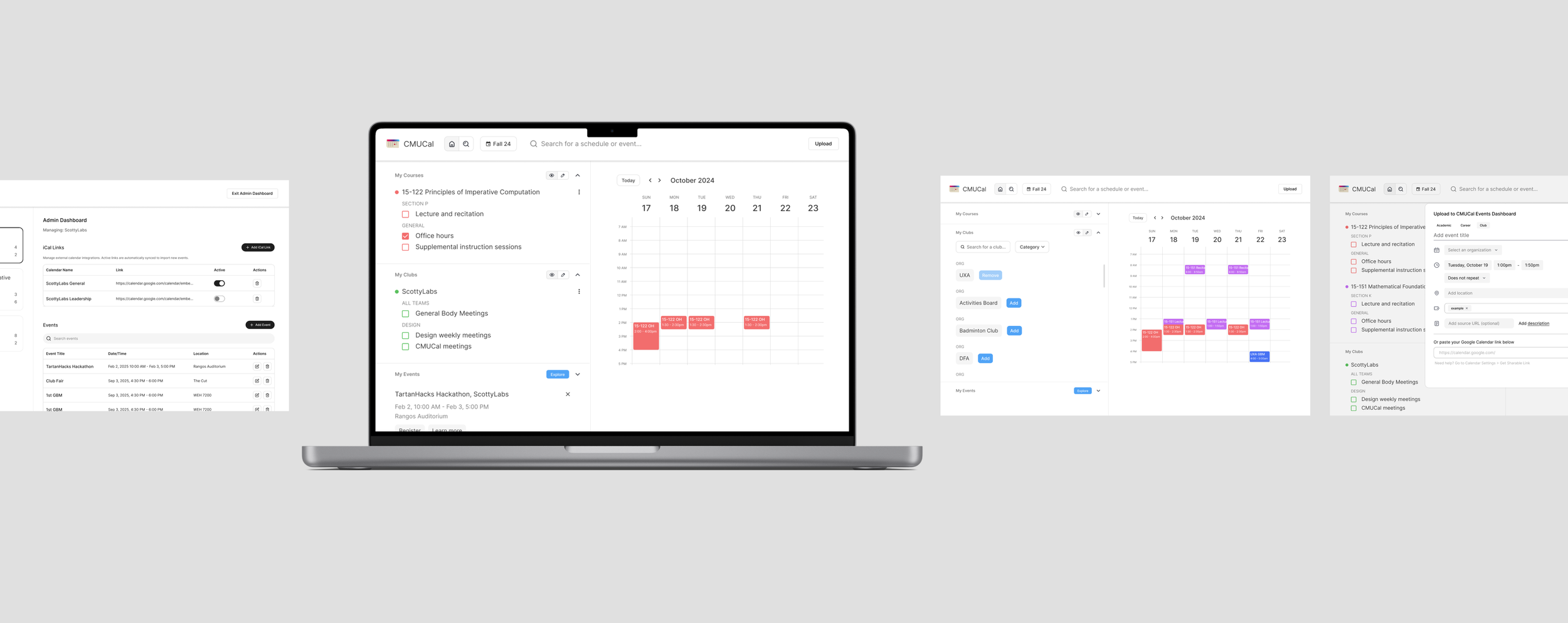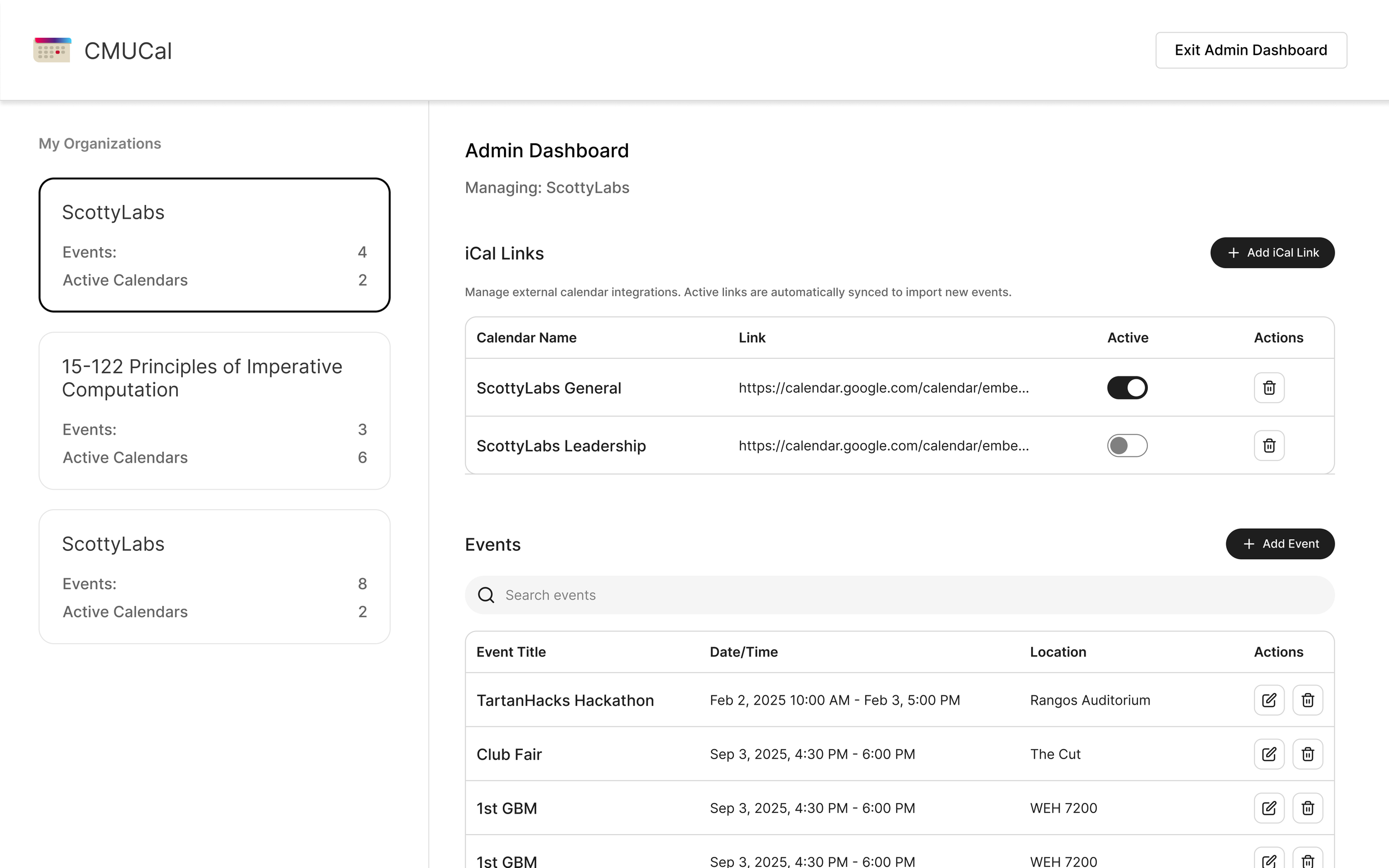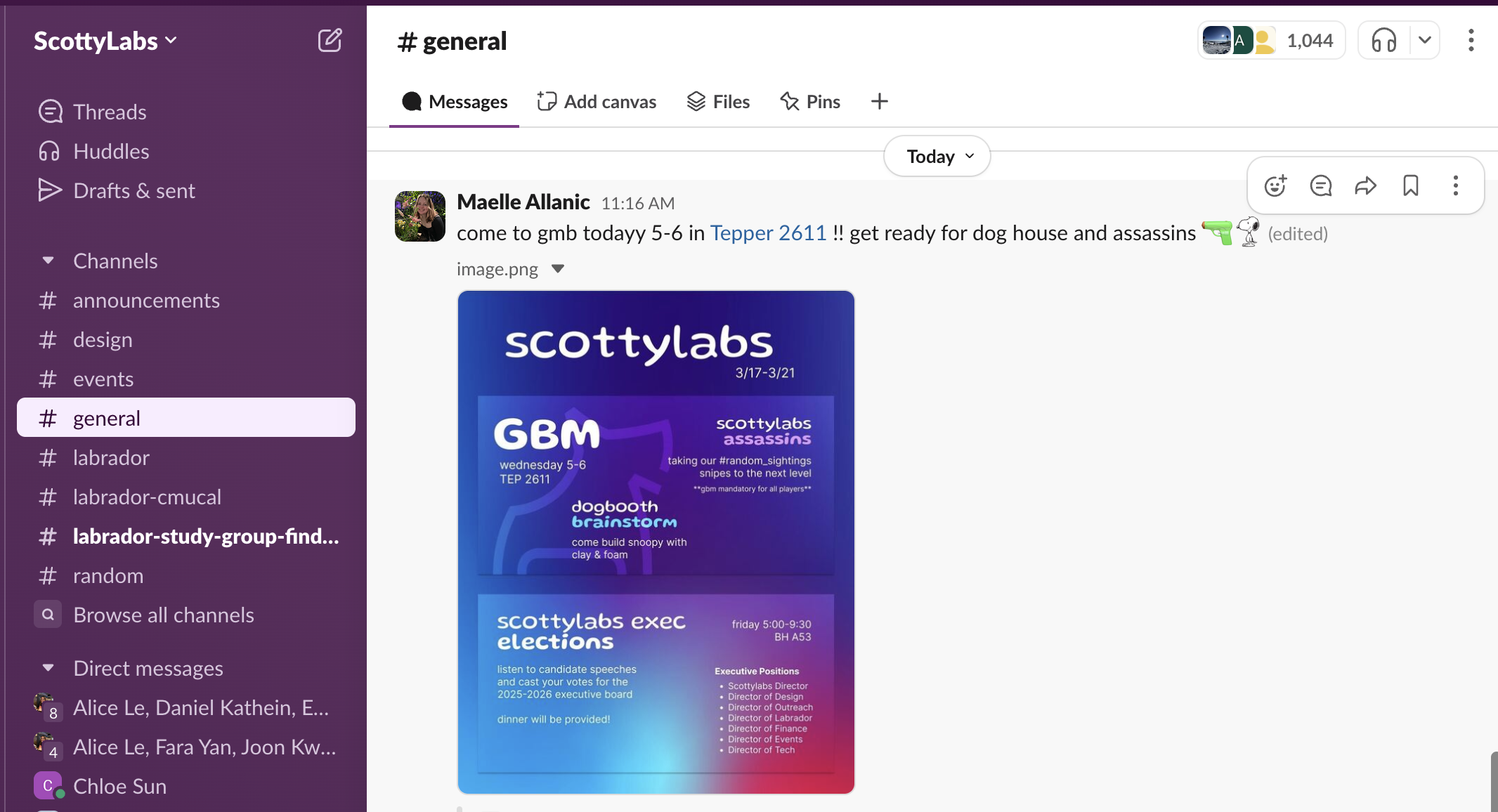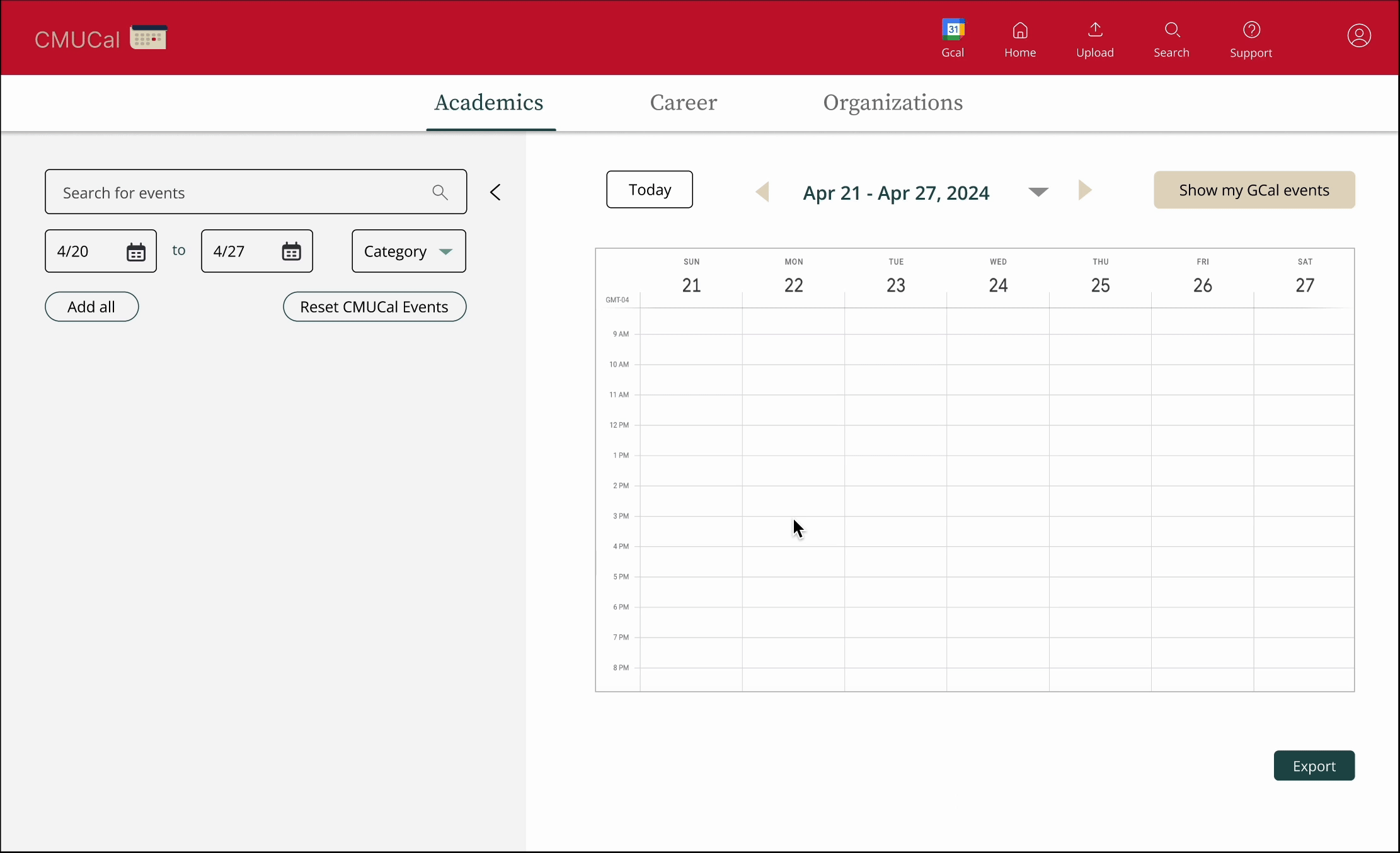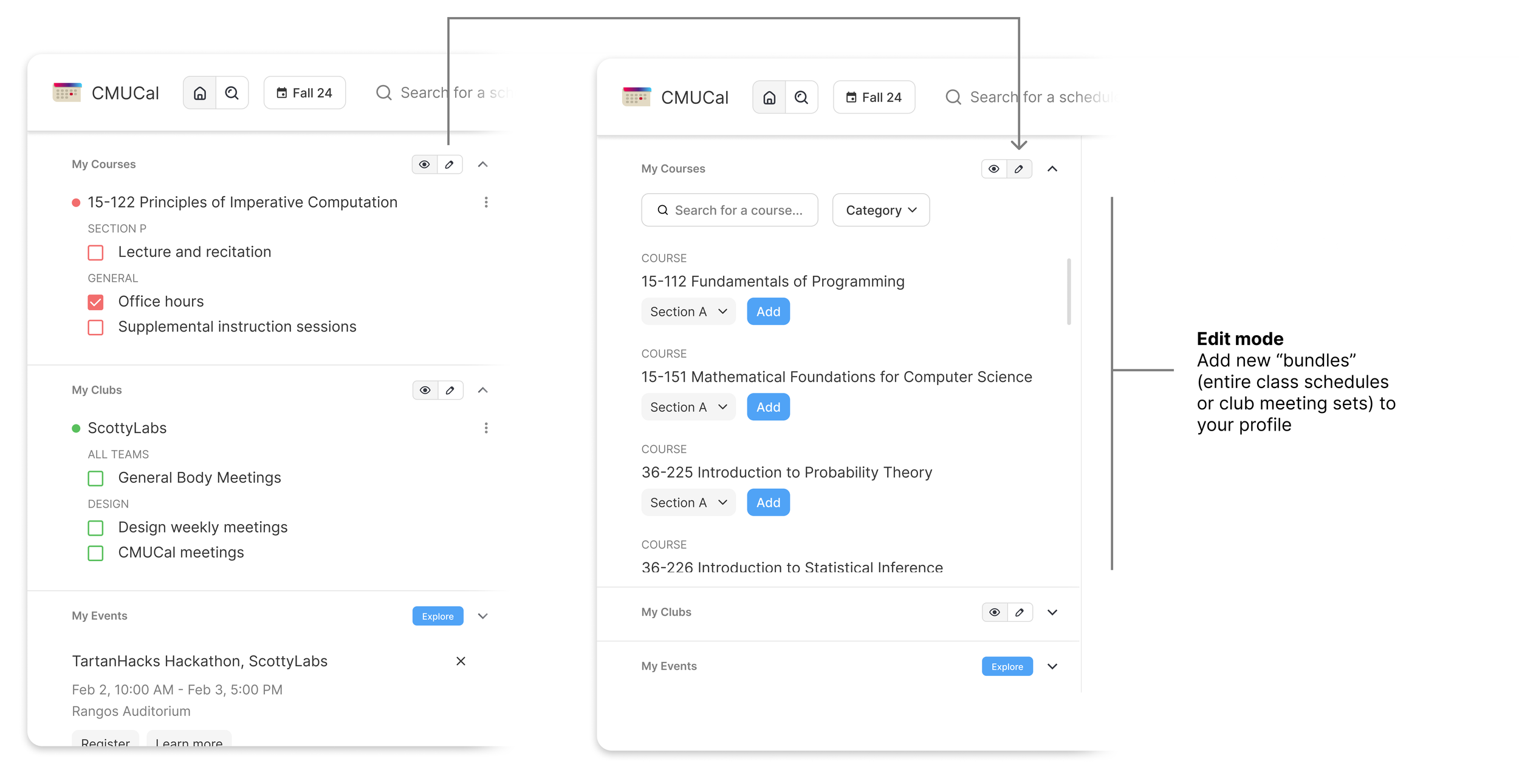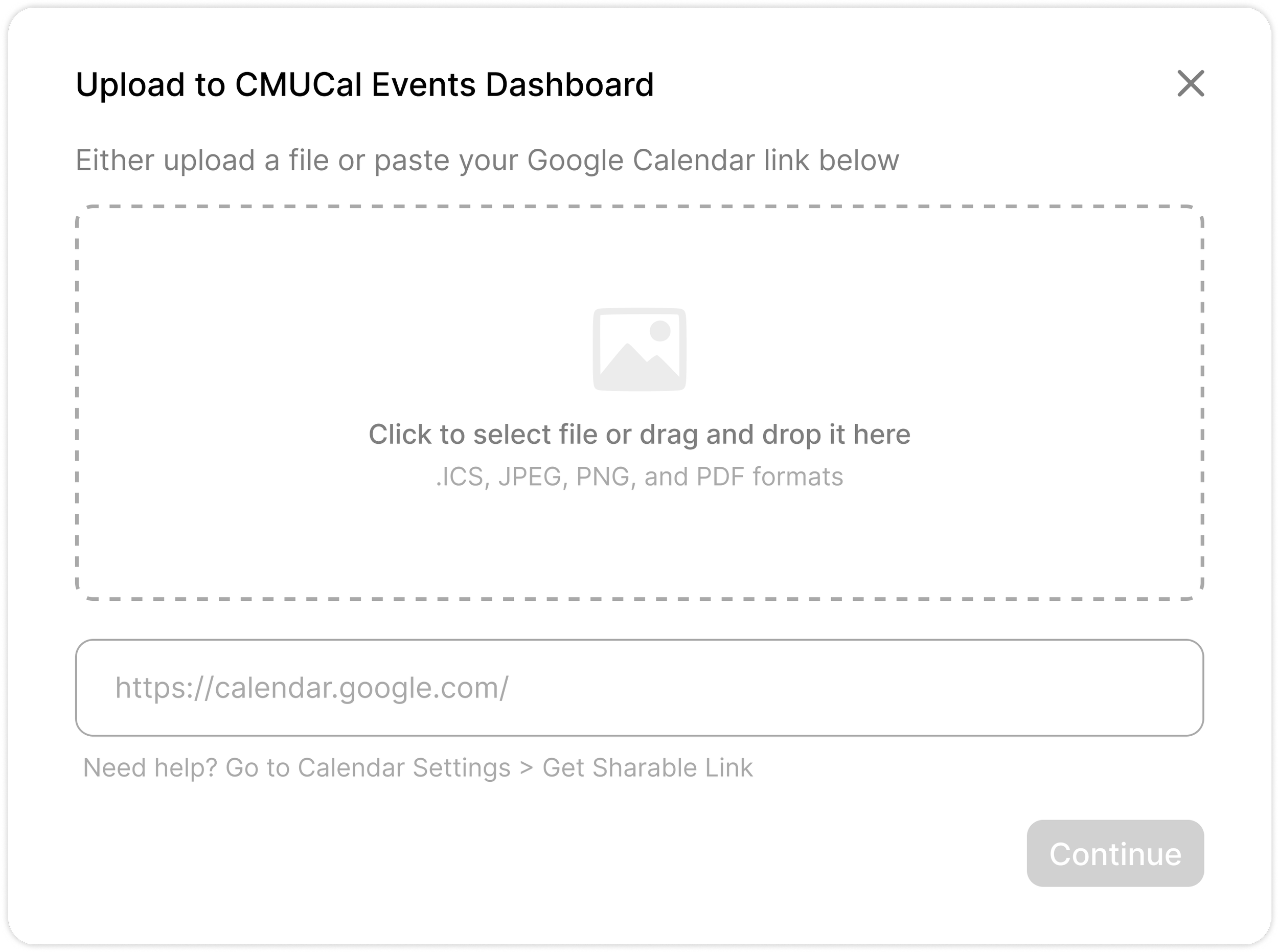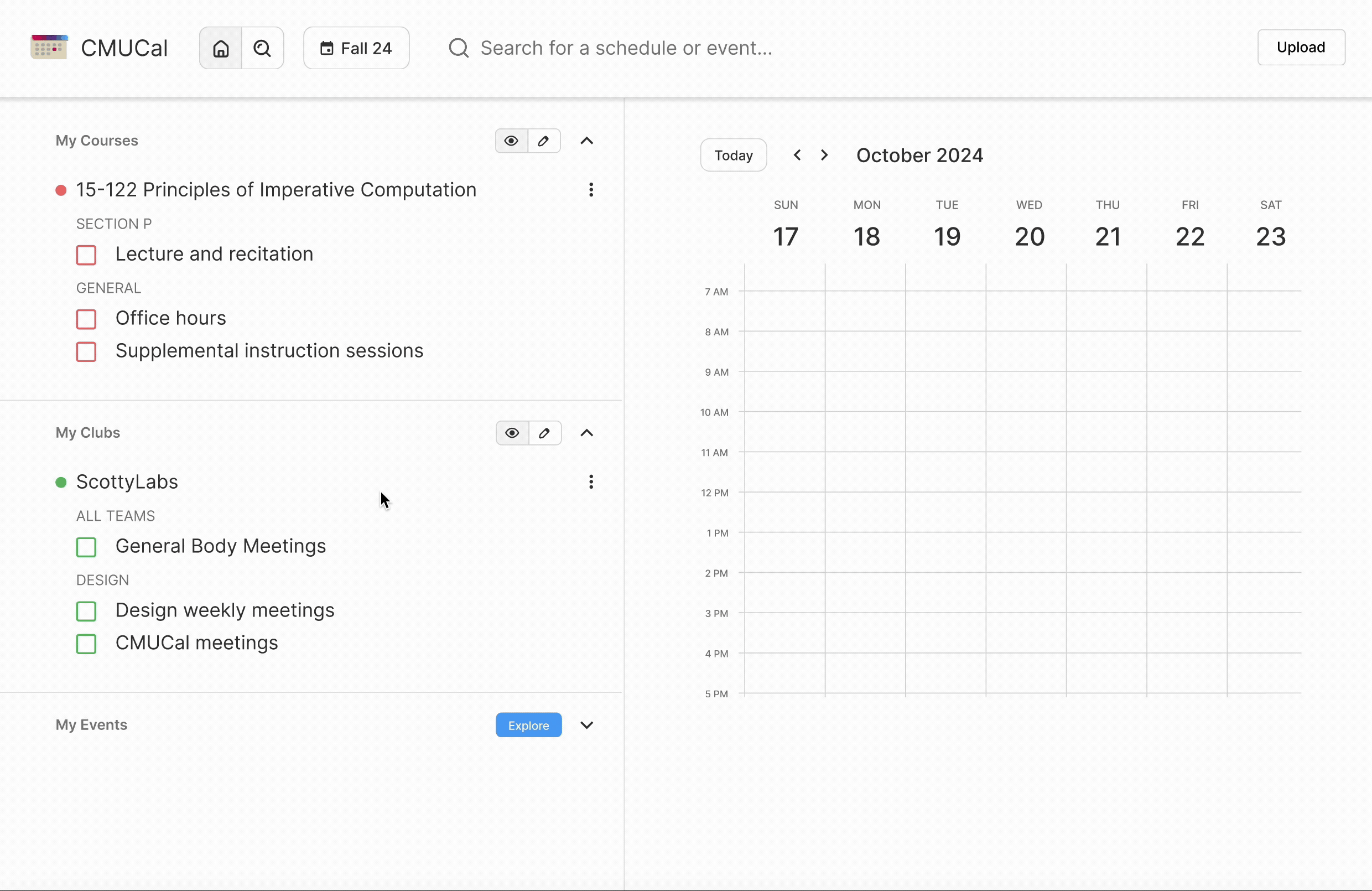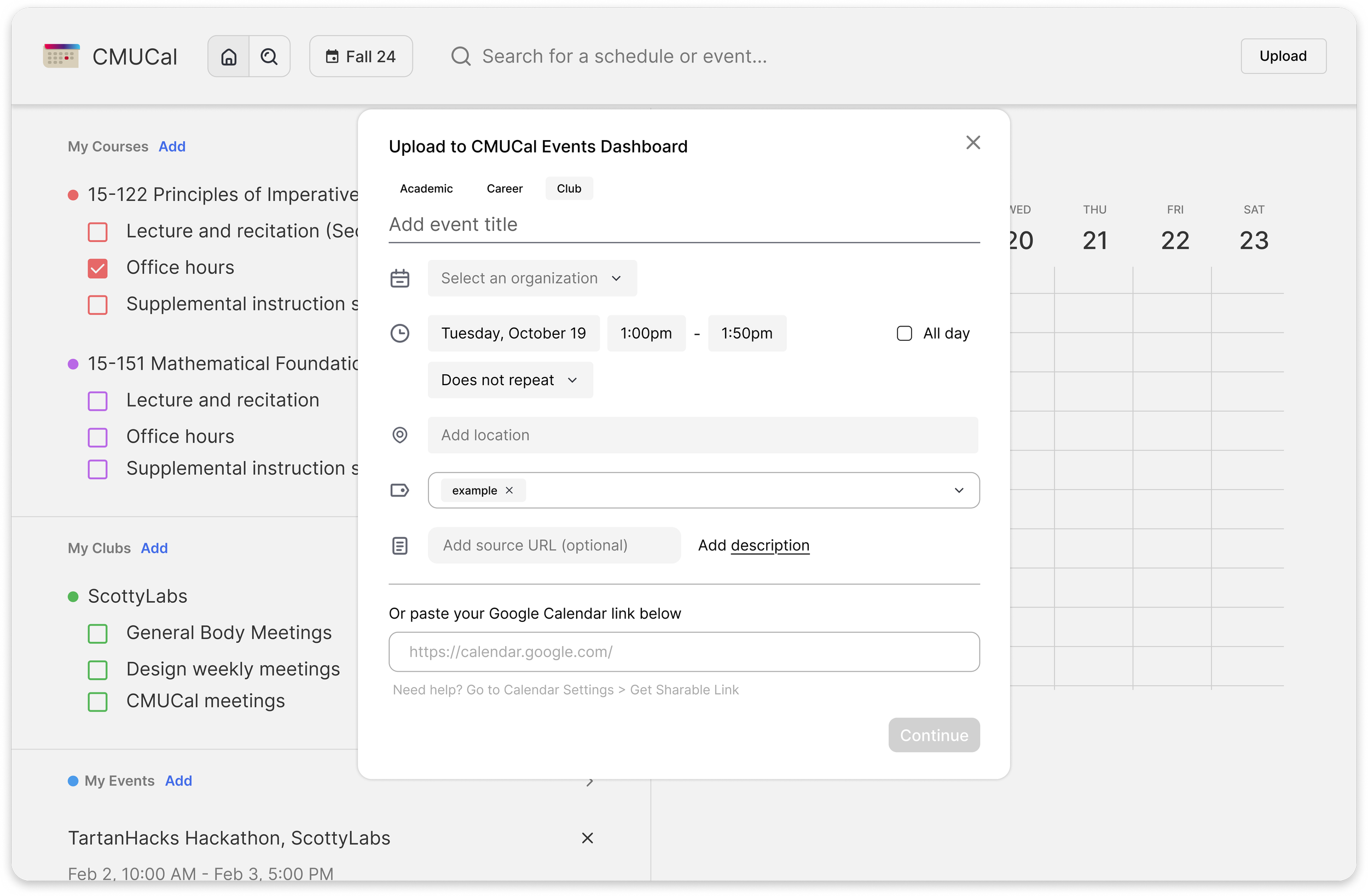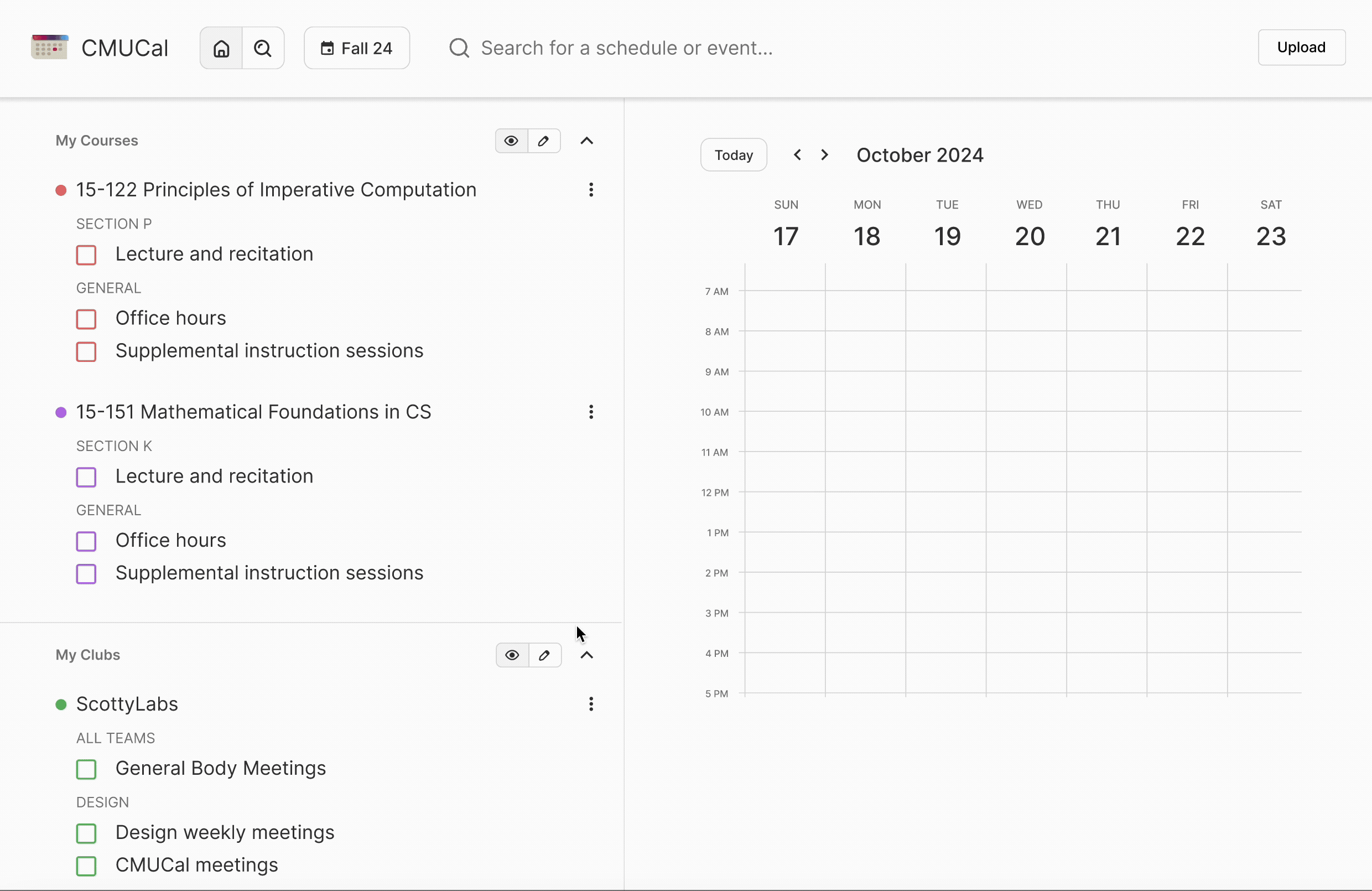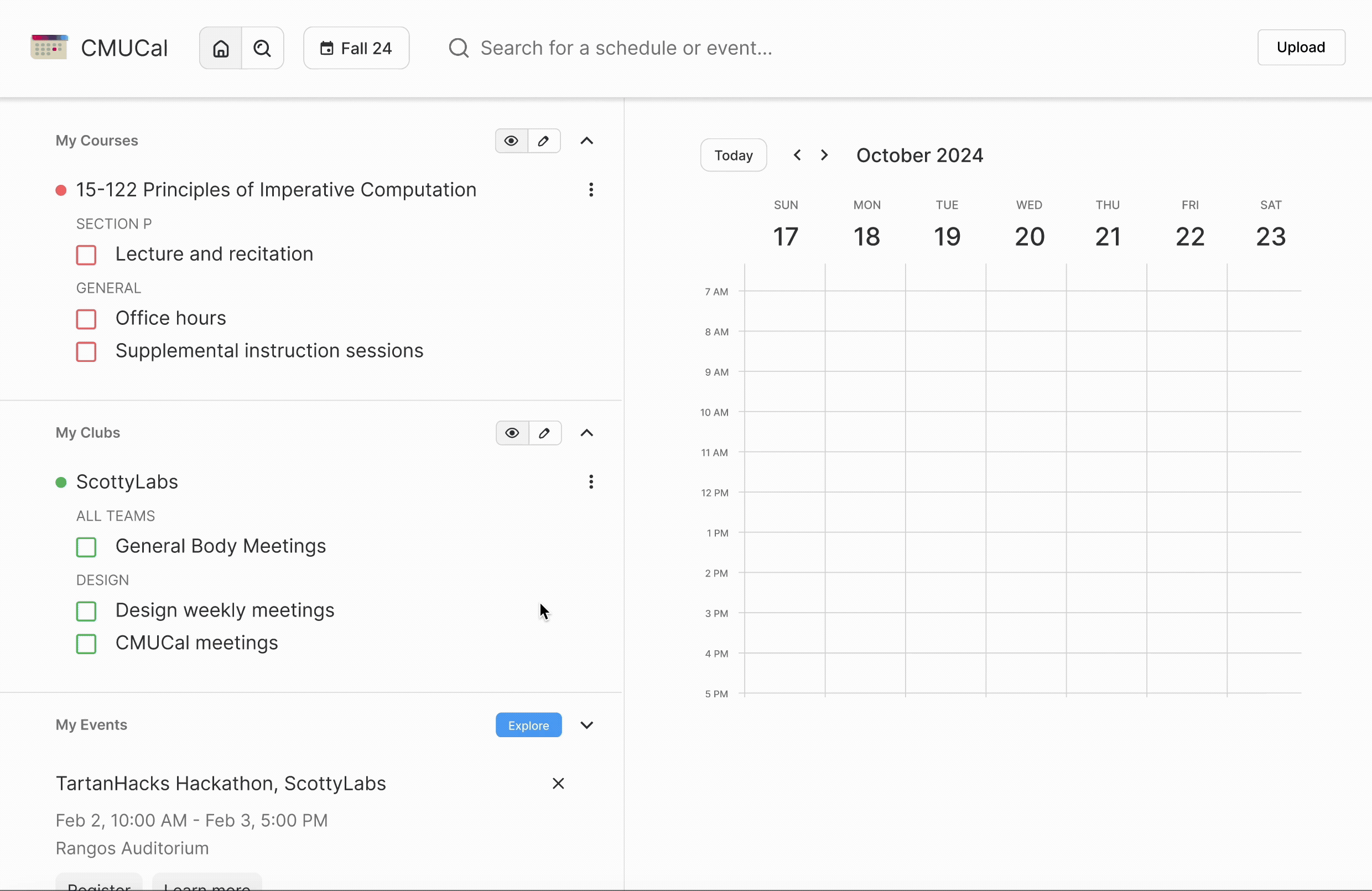CMUCal
An innovative calendar management system for CMU students that aims to aggregate educational and career resources into a central platform that acts as an extension of students’ personal calendars.
Duration
3 months
Role
User Research
UI/UX Design
Design-Dev Collaboration
We interviewed 10+ students, and summarized into the following 3 pain points:
Figma
Team
Joon Kwon, Cici Ge, Daniel Kathein, Fara Yan, Alice Le, Laasya Bosukonda
Tools
CMUCal, a unified scheduling platform for students to manage both their recurring commitments and exploratory events. It also links directly with Google Calendar, any visibility toggles or actions within the CMUCal interface reflect immediately on the student’s personal calendar. Data sources can also be uploaded by students, course staff, clubs, or admins, making it a user-driven platform where the community curates event content.
Overview
CMUCal
My Role
The Problem
A Disjointed Ecosystem for Student Events
At Carnegie Mellon, student life is rich and fast-paced — classes, clubs, and career opportunities constantly overlap. But the event and schedule ecosystem is deeply fragmented, forcing students to manually piece together their lives.
There’s no single place to see everything you care about. Instead:
Courses use different systems (Canvas, Piazza, instructor websites).
Clubs send info through Discord, Slack, mailing lists.
Career events live on Handshake, email blasts, or random PDF flyers.
Other events (performances, fairs) are often only promoted via posters or newsletters.
This fragmentation creates not only frustration, but missed opportunities and a constant feeling of disorganization.
Goals
Reimagine how students discover, organize, and revisit campus events, all in one place.
Instead of relying on fragmented platforms like Slack, Google Calendar, or random spreadsheets, this solution aims to centralize event organization around student needs, reducing friction, promoting reuse, and making campus life easier to manage.
Solution Overview
CMUCal is a centralized calendar platform designed to simplify event management for the Carnegie Mellon University community. It enables students to easily search for and add academic, career, and extracurricular events, such as office hours, lectures, club meetings, and career fairs, directly to their Google Calendar. By streamlining the process of discovering and organizing events, CMUCal helps students stay informed and manage their commitments more efficiently.
I worked with another designer, three developers, and a product manager. My responsibilities included developing user flows, wireframes, and prototypes, conducting usability testing, and iterating on designs based on feedback.
Upload — Contributed by the Community
We allow students and groups to easily contribute events through structured forms or by linking a public Google Calendar. This approach supports data consistency while empowering the community to enrich the platform with both one-time and recurring events.
Explore — Discover One-Time Events
A dedicated Explore page to highlight individual, one-time events like career fairs, guest lectures, and hackathons. It supports the more exploratory mindset students have when looking for new opportunities.
Admin Dashboard
Built for course staff and club leads — Admins have access to a dashboard to upload and maintain their official schedules. This supports accuracy while reducing the friction between event organizers and end users.
I used a toggle button to integrate editing mode directly into the page, enabling users to easily curate their profile by adding or removing bundles that align with their semester commitments.
Upload
A core principle behind CMUCal is community contribution: schedules and events are created not only by course/club admins, but also by individual students who surface one-time events they care about.
In early explorations, I considered a freeform upload box to support fast captureI. However, this approach raised key usability concerns:
Incomplete information: Many uploads lacked critical event metadata, requiring manual follow-up
Quality control: Without standardized fields, the experience risked becoming cluttered or unreliable for other users
Hence, I introduced a structured input form for contributing events to better align with our goal of a trustworthy, scalable, and navigable platform.
Final Design Walkthrough
What Didn’t Work in v1
Lack of semantic structure
No way to group events into meaningful units like “15-112 Schedule”
Hard-to-use information architecture
Categories like “Academic,” “Career,” “Clubs” didn’t reflect how students think
Students organize their time by semester, not by type of event
No user profile or personalization
Everyone saw the same homepage and events
No way to “own” your recurring schedules or filter by what matters to you
Next Steps
Development and Launch Timeline
CMUCal v2 is expected to launch in Spring 2026. Until then, I’m continuing to support the development team by providing detailed design documentation and edge case flows.
Takeaways
Designing CMUCal v2 challenged me to shift from crafting individual screens to architecting a cohesive system that mirrors how students actually organize their lives. I learned how powerful it is to structure UX decisions around mental models, like separating recurring schedules from one-time events, to reduce clutter and improve navigation. I also grew as a collaborator, supporting developers not just through specs, but by translating ambiguous logic into clear design rules and working with them to debug layout and upload behaviors.
Process
CMUCal v1
Our team spent a full semester exploring and designing CMUCal v1. We aimed to centralize student events across Academics, Clubs, and Careers. The system treated every event, lectures, office hours, club meetings, as individual cards. But as we scaled and tested with more students, the limitations of this version became clear.
Key Design Changes
Shift from event-centric to schedule-centric thinking
Personalized Control
CMUCal v1 treated every single occurrence as an individual event. In v2, I introduced a more structured model that distinguishes between Schedules (recurring, structured commitments like weekly lectures or club meetings) and Events (one-time, exploratory happenings). This change better supports how students mentally organize their time.
I also replaced the generic search page with a personalized Profile/Home page—a semester-specific dashboard that centralizes user’s enrolled schedules and relevant events.
Home / Profile — Your Semester at a Glance
The Home page becomes your personal calendar hub, tailored to your enrolled courses and club memberships. Recurring activities like lectures, labs, meetings, and rehearsals are bundled into editable schedule blocks. With the Edit Mode toggle, you can add/remove bundles to curate your semester view.
